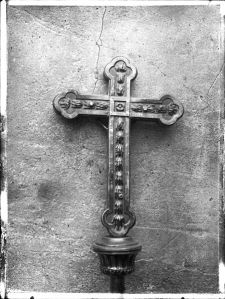G.K. Chesterton once said that “Tradition means giving a vote to most obscure of all classes, our ancestors. It is the democracy of the dead…Tradition refuses to submit to the small and arrogant oligarchy of those who merely happen to be walking about. All democrats object to men being disqualified by the accident of birth; tradition objects to their being disqualified by the accident of death. Democracy tells us not to neglect a good man’s opinion, even if he is our groom; tradition asks us not to neglect a good man’s opinion, even if he is our father.”
To honor that sentiment and to stave off an easy chronological snobbery, today’s post comes straight from the mouths (or pens) of men and women who have died in the faith.
From Hannah Hurnard‘s HINDS FEET ON HIGH PLACES
 “Much-Afraid trembled a little, partly at the tone of his voice and partly because she was still Much-Afraid by nature and was already trying to picture what the Forests of Danger and Tribulation would be like. That always had a disastrous effect upon her, but she answered penitently, ‘No – I know that you are not a man who would lie to me; I know that you will make good what you have said.
“Much-Afraid trembled a little, partly at the tone of his voice and partly because she was still Much-Afraid by nature and was already trying to picture what the Forests of Danger and Tribulation would be like. That always had a disastrous effect upon her, but she answered penitently, ‘No – I know that you are not a man who would lie to me; I know that you will make good what you have said.
“’Then,’ said the Shepherd, speaking very gently again, ‘I am going to lead you through danger and tribulation, Much-Afraid, but you need not be the last bit afraid, for I shall be with you. Even if I lead you through the Valley of the Shadow itself you need not fear, for my rod and my staff will comfort you.’
Then he added, ‘Thou shalt not be afraid for the terror by night; nor for the arrow that flieth by day; nor for the pestilence that walketh in darkness; nor for the destruction that wasteth at noonday. Though a thousand fall at thy side, and ten thousand at they right hand, it shall not come nigh thee…For I will cover thee with my feathers, and under my wings shalt thou trust’ (Psa. 91:4-7). The gentleness of his voice as he said these things was indescribable.
Then Much-Afraid knelt at his feet and built yet another altar and said, ‘Yea, though I walk through the Valley of the Shadow of Death, I will fear no evil: for thou art with me.” Then, because she found that even as she spoke her teeth were chattering with fright and her hands had gone quite clammy, she looked up into his face and added, ‘For thou art not a man that thou shouldest lie, nor the Son of man that thou shouldest repent. Hast thou said, and shalt thou not do it? And hast thou spoken and shalt thou not make it good?’
Then the Shepherd smiled more comfortingly than ever before, laid both hands on her head and said, “Be strong, yea, be strong and fear not.” Then he continued, “Much-Afraid, don’t ever allow yourself to begin trying to picture what it will be like. Believe me, when you get to the places which you dread you will find that they are as different as possible from what you have imagined, just as was the case when you were actually ascending the precipice.
I must warn you that I see your enemies lurking among the trees ahead, and if you ever let Craven Fear begin painting a picture on the screen of your imagination, you will walk with fear and trembling and agony, where no fear is.” When he had said this, he picked up another stone from the place where she was kneeling, and gave it to her to put with the other memorial stones. Then he went his way, and Much-Afraid and her companions started on the path which led up through the forests.”